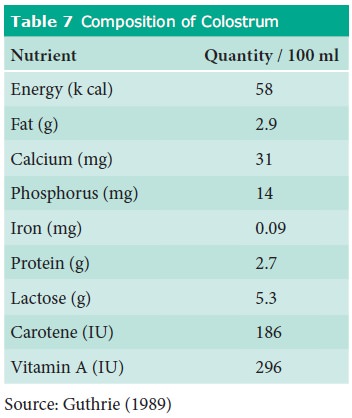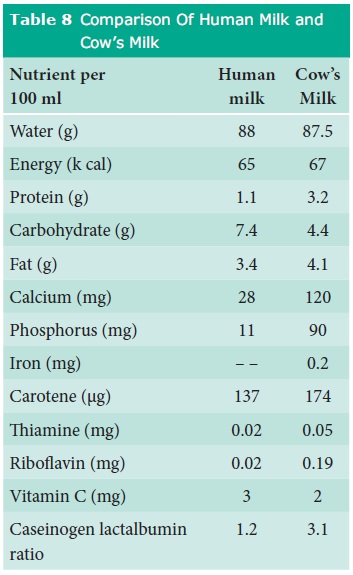Chapter: 11th Home Science : Chapter 6 : Family Meal Management
Advantages of breast feeding
Breast Feeding
Infants who are exclusively breast fed for the first 6
months of life grow well and breast feeding is beneficial not only during this
period but also during later years of life. The infant is put on the breast
within half an hour after a normal delivery.
American Academy of Paediatrics(2005) firmly
adheres to the position that breast-feeding ensures the best possible health as
well as the best developmental and psy-chosocial outcomes for the infants
Colostrum: During first two or three days colostrum is secreted in small
quantities of about 10-40 ml. The composition of colostrum is as follows:

Colostrum contains an interferon like substance which has
strong antiviral activity. It contains a B12 binding protein making it
unavailable for the growth of E-coli and other bacteria. It also contains antibodies against viral infection.
Advantages of breast feeding
Breast feeding is the simple and best method of feeding
and has the following advantages
1. Nutritional factor
The composition of human milk is best suited for infants.
In human milk the pro-tein content is lower but the content of car-bohydrate,
namely lactose is higher. The fat content is comparatively less. The pro-tein
is present as lactalbumin which is bet-ter digested than the protein in cow’s
milk. Lactose provides natural sweetness and also helps in absorption of
calcium and iron. Fat though less is highly emulsified and therefore better
digested. When compared to animal milk, breast milk provides higher amount of
vitamin C. Similarly calcium in breast milk though less when compared to cow’s
milk is better absorbed by the infant. The composi-tion of human milk is best
suited for infants. The table 8 below shows the comparison of Human milk and
cow’s milk.
2. Hormones and growth factors: Breast milk is a rich source of
hormones like Thyroid Stimulating Hormone (TSH), thyroxin, insulin and
prolactin. It also contains growth regulating factors, growth promoters and
growth modulators.

3. Immunological factors:
The following factors in breast milk pro-vide passive
immunity.
·
Macrophages: They can digest bac-teria and also
develop immunity against infectious diseases.
·
Lymphocytes: Lymphocytes produce antiviral
substances like interferon.
·
Lactoferrin: It is an iron binding protein
that inhibits the growth of E.coli and
other bacteria.
·
Enzymes: Breast milk also sup-plies enzymes
like lipase, amylase and lactoperoxidase which increase digestibility and also
destroy the harmful microorganisms.
·
Immunoglobulin: They are defen-sive proteins which
include all types of antibodies.
4. Economic factors
Breast milk is the most economical food for the baby. Even
after accounting the extra food cost required by the mother, breast milk is
cheaper than any other type of artificial feed.
5. Psychological factors
Breast feeding is essential for a healthy, happy and
emotional relationship between the mother and the infant.
6. Natural contraceptive
Breast feeding prevents the onset of another pregnancy and
also prevents breast cancer.
7. Other advantages:
·
Infants
jaw is more fully developed.
·
Breast
milk is microbiologically sterile.
·
Human
milk is always fresh and at the right temperature.
·
It
is convenient to administer at any time.
·
Breast
fed babies have better cogni-tion and IQ later in life when com-pared to bottle
fed babies.
Artificial feeding
Though breast milk is the best milk and there can be no
substitute for it, there are certain circumstances during which the infant
needs to be given artificial feeds.
Reasons
·
Illness
of short duration like fever, or severe illness like tuberculosis and heart
disease.
·
The
mother is on steroids, antico-agulants or radioactive drugs.
·
Insufficient
milk secretion.
·
Death
of mother.
Related Topics